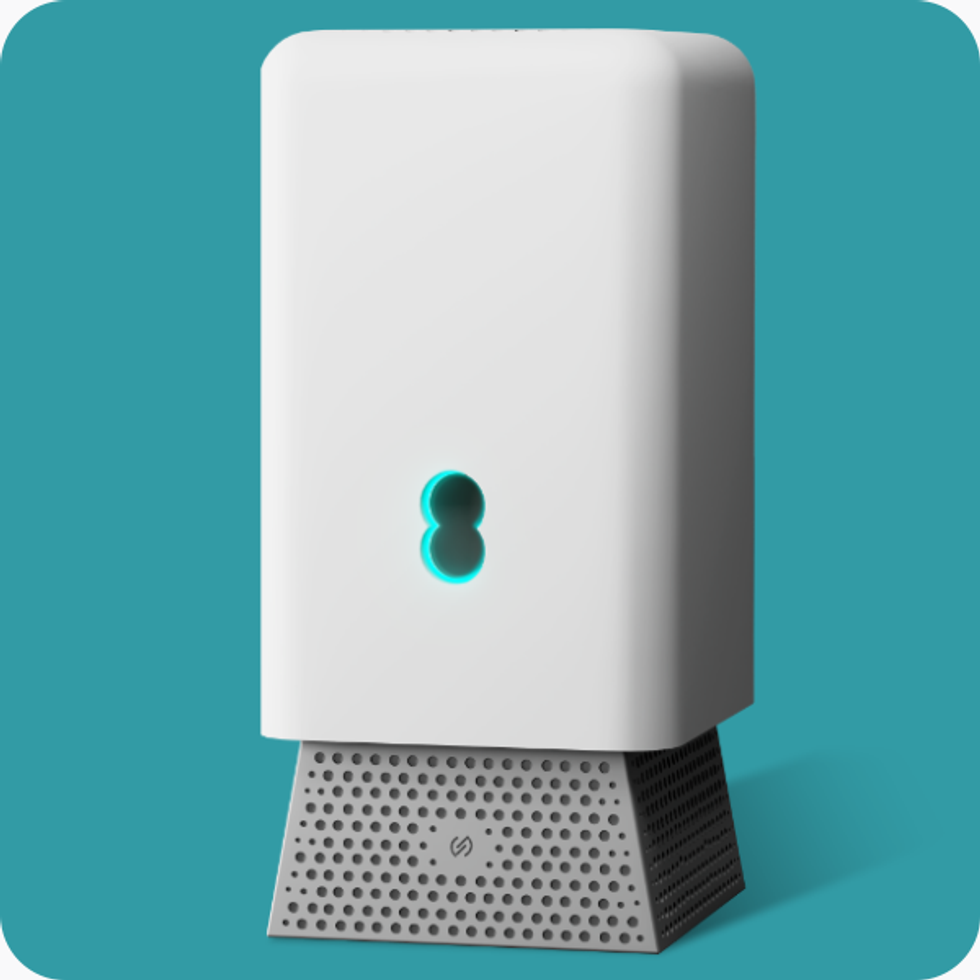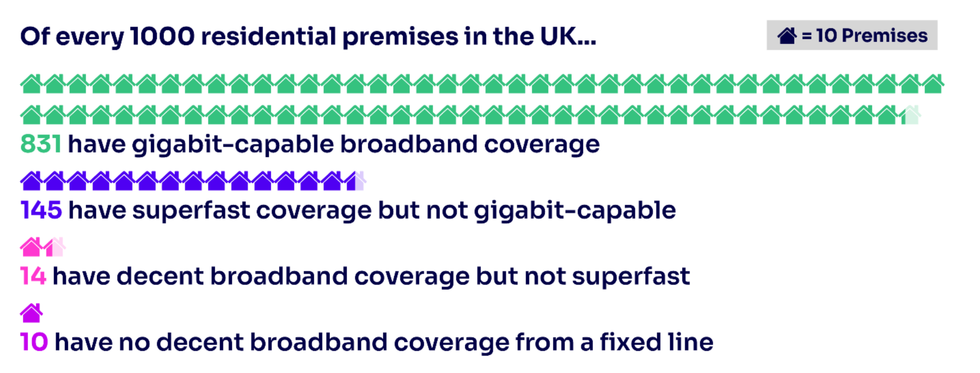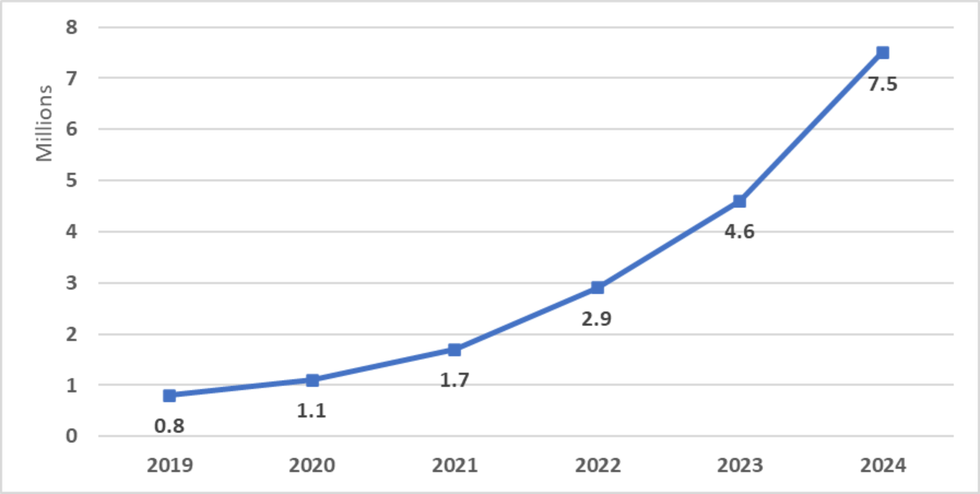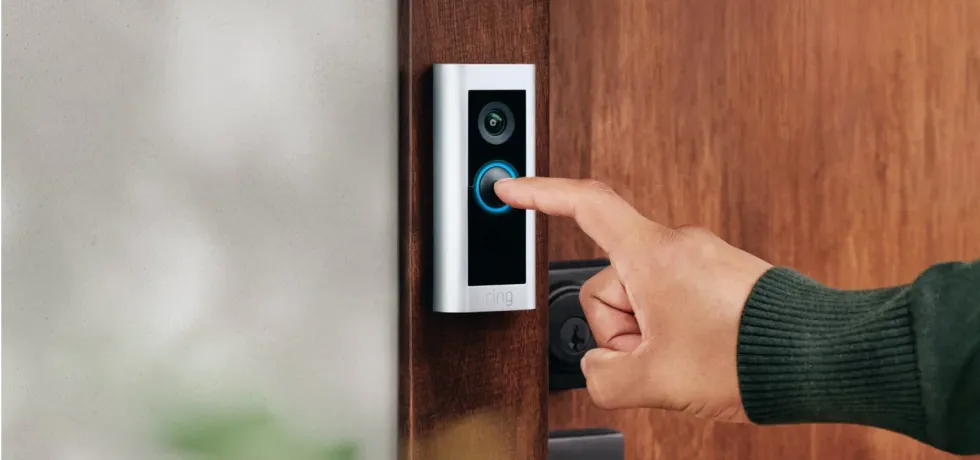
According to the latest figures from Ofcom, the UK is on schedule to hit Government targets of 85% full-fibre connections by 2025 ...although adoption still lags behind availability
GETTY IMAGES | PICTURE POSED BY MODEL

All products and promotions are independently selected by our experts. To help us provide free impartial advice, we will earn an affiliate commission if you buy something. Click here to learn more
Ofcom research shows 69% of UK homes now have access to these full-fibre broadband connections
- Connected Nations 2024 report from Ofcom shows expansion of full-fibre internet
- It has increased from 57% of all UK homes in September last year up to 69%
- Full-fibre broadband offers better reliability and faster downloads
- It's capable of download speeds of over 1,000Mbps
- For comparison, Netflix recommends just 15Mbps for its 4K UHD picture quality
Don't Miss
Most Read
Trending on GB News
Fast full-fibre broadband is now available in 20 million homes across the UK, fresh figures from Ofcom have revealed.
Using fibre-optic cables for every part of the broadband connection — from the cabinet in the street into your home — instead of traditional copper lines makes full-fibre broadband faster and more reliable. It's also required for the fastest downloads, with most full-fibre connections able to deliver gigabit-capable speeds.
Full Fibre 300 still available at EE's "best ever price" in extended Black Friday sale

With average download speeds of 308Mbps — that's 4x faster than the average home broadband connection in the UK — and a guaranteed speed of 150Mbps, this full-fibre internet bundle is ideal for those with a busy household. It will be able to handle multiple people streaming, making calls, uploading photos to the cloud, and more. EE has ditched the delivery cost and activation fee this Black Friday and will pay £300 to end your current contract if you want to switch ASAP
EE Full Fibre 300
$56.99
$32.99
Gigabit connections offer 14x faster connections, offering buffer-free video calls and streaming, speedy file downloads and back-ups to the cloud, even in the busiest households.
As millions continue to work from home in the UK, and more people now watch TV shows and movies online over traditional terrestrial channels, faster broadband connections are becoming more and more important for Britons.

Ofcom publishes its report into the state of broadband across the UK every year, with the latest iteration showing the UK is on track to hit its target of 85% full-fibre by 2025
OFCOM CONNECTED NATIONS REPORT 2024
Research has shown that speedier internet can even boost the value of your home.
According to the latest Connected Nations report from Ofcom, 69% of UK homes now have access to these full-fibre broadband connections. That's a sizeable increase from 57% recorded in September last year.
Amid this uptick in people moving to higher-speed broadband packages, Ofcom said the UK’s average maximum download speed has risen from 170Mbit/s to 223Mbit/s in 2024.
The latest figures suggest that the Government’s target of having 85% of the UK covered by a gigabit-capable fibre broadband by 2025 is very likely to be reached.
As you might expect, living in an urban area means you're still more likely to have a full-fibre broadband connection into your home than in rural areas, at 71% and 52%, respectively.

Not every household that has a full-fibre connection available takes advantage of those speeds, with adaptation rates sitting at around 35% nationwide, Ofcom figures show
OFCOM CONNECTED NATIONS REPORT 2024
Ofcom Networks and Communications Group Director, Natalie Black said: "It’s a record-breaking year for broadband in the UK, as the rollout of full fibre continues to steam ahead.
"Whether you’re running a business, streaming your favourite programmes, or doing Christmas shopping online, it’s more likely than ever that you’ll be able to benefit from a fast and reliable broadband connection."
Despite the dramatic increase in availability — many Britons are choosing not to switch to a faster, full-fibre connection. Ofcom figures show sign-up numbers have increased from 28% to 35% – that's roughly 7.5 million homes – with take-up of full fibre notably higher in rural areas.
There are multiple reasons why people might choose not to switch to faster broadband. Internet Service Providers, ISPs, typically charge more for faster download speeds, with gigabit broadband costing between £48 per month (Sky Broadband) to £54.99 per month (BT).
That’s over £650 per year to enjoy these faster speeds.
If you’re living in a busy household with multiple people using broadband to stream television, download software updates, back up their photos and devices, make video calls, play video games, and watch YouTube clips – the more bandwidth available, the smoother the experience for everyone.
Smart home devices, such as Wi-Fi-enabled thermostats, video doorbells, and smart speakers all require bandwidth – and can quickly add up.
If you're unsure about what broadband speed you need in your home. We've put together the average download speeds for an hour-long television show episode in Standard Definition (SD), roughly 450MB in size.
- 69Mbps, the average broadband speed in the UK: 56 seconds
- 150Mbps, the lowest speed available with most full-fibre packages: 24 seconds
- 500Mbps, widely available from all full-fibre providers: 7 seconds
- 1Gbps (or 1,000Mbps) is not available from all broadband companies: 4 seconds

Smart Home gadgets, like Ring video doorbells, take up a small amount of your bandwidth that can slowly add-up in busy households — slowing everything down unless you have a fast full-fibre connection
RING PRESS OFFICEAll of these improvements mean that there has been a reduction in the number of premises unable to get decent broadband – down from 61,000 to 58,000 since last year. Ofcom estimates this'll fall further to 26,000 by mid-2027.
LATEST DEVELOPMENTS
- Your Freely TV will soon support GB News
- Best Sky Stream deals
- Millions flock to Windows 10 despite increased malware risk
- Best VPN deals
- Virgin Media shakes up annual broadband price rises for millions
Elsewhere, the report showed that the availability of mobile 5G continues to grow, and now accounts for more than a fifth of all monthly mobile data traffic in the UK. The study also noted a sharp rise in the uptake of satellite-based broadband.
Ofcom’s report said that in 2024, connections through Elon Musk’s Starlink reached 87,000 – mostly in rural areas – more than double the 42,000 connections in 2023.
Additional Reporting By Martyn Landi, PA Technology Correspondent







